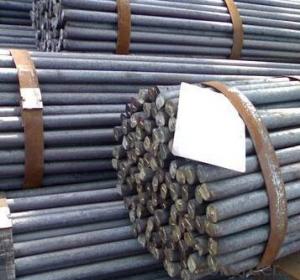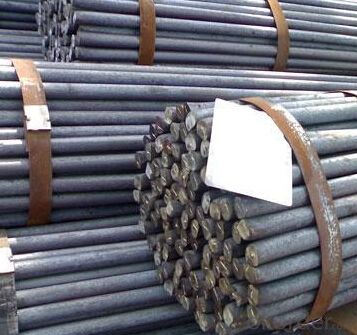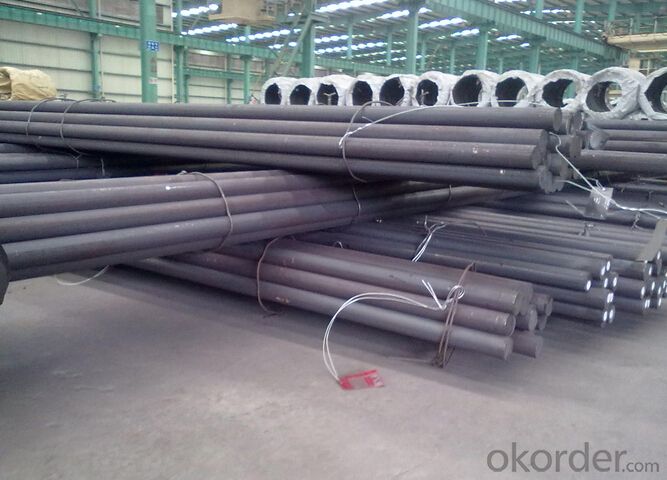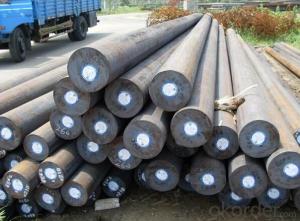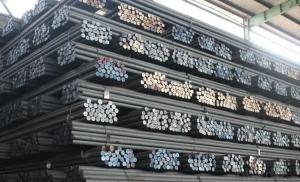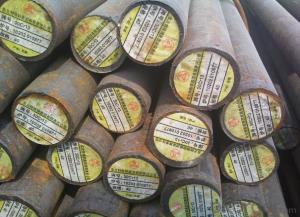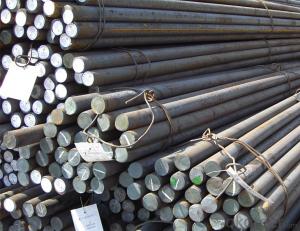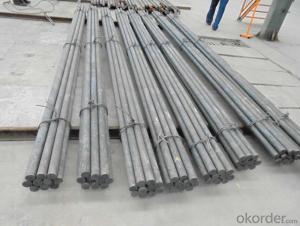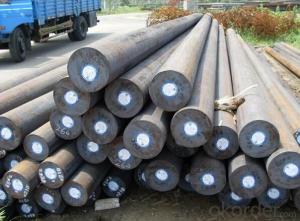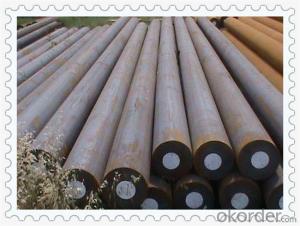Round Bar Reinforcing Steel Bars Q345 Special Steel
- Loading Port:
- China main port
- Payment Terms:
- TT OR LC
- Min Order Qty:
- 30 m.t.
- Supply Capability:
- 10000 m.t./month
OKorder Service Pledge
OKorder Financial Service
You Might Also Like
Specification
Main Product
Plastic Mould Steel
DIN 1.2311,1.2738,1.2083,1.2316 etc.
AISI P20,P20+Ni,420 etc.
JIS SUS420J2
Hot Work Steel
DIN 1.2344,1.2343,1.2367,1.2365,1.2581,1.2713 etc.
AISI H13,H11,H10,H21, etc.
JIS SKD61,SKD6,SKD5,SKT4 etc.
Cold Work Steel
DIN 1.2739, 1.2601, 1.2080, 1.2436, 1.2631, 1.263, 1.2510, 1.2327 etc.
AISI D2, D5, D3, D6, A8, A2, O1 etc.
JIS SKD10, SKD11, SKD1, SKS3 etc.
High Speed Steel
DIN 1.3343, 1.3243, 1.3247, 1.3355 etc.
AISI M2, M35, M42, T1 etc.
JIS SKH51, SKH35, SKH59, SKH2 etc.
Alloy Structural Steel
DIN 1.7035,1.6511,1.7220,1.7225 etc.
AISI 5140, 4340, 4135, 4140 etc.
JIS SCr440,SNCM439,SCM435,SCM440 etc.
Stainless & Carbon Steel or Others
DIN 1.4125,1.1191 etc
AISI 440C,1045, 1020 etc.
JIS SUS440C,S45C etc
Product show
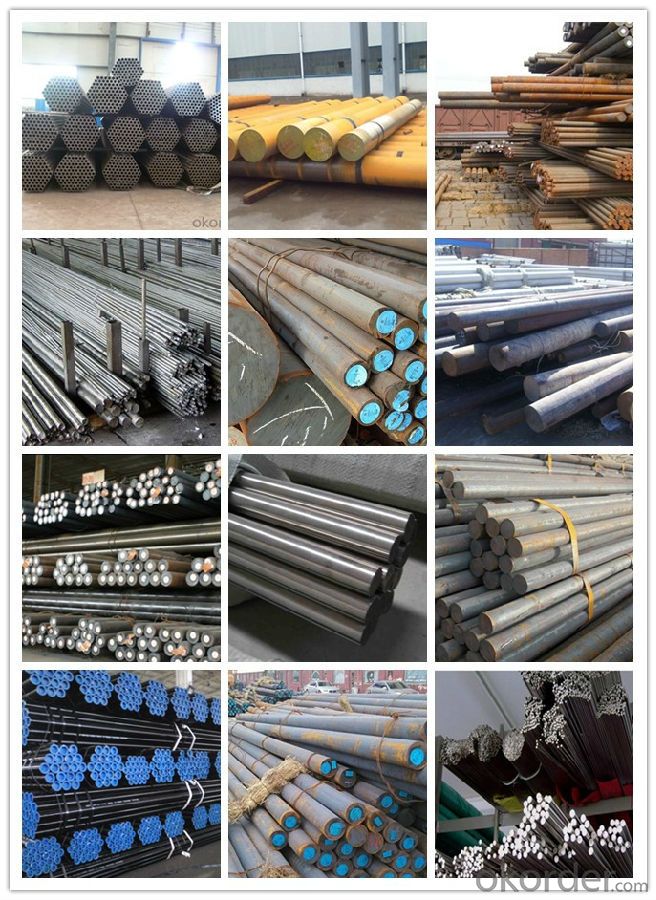
Workshop show
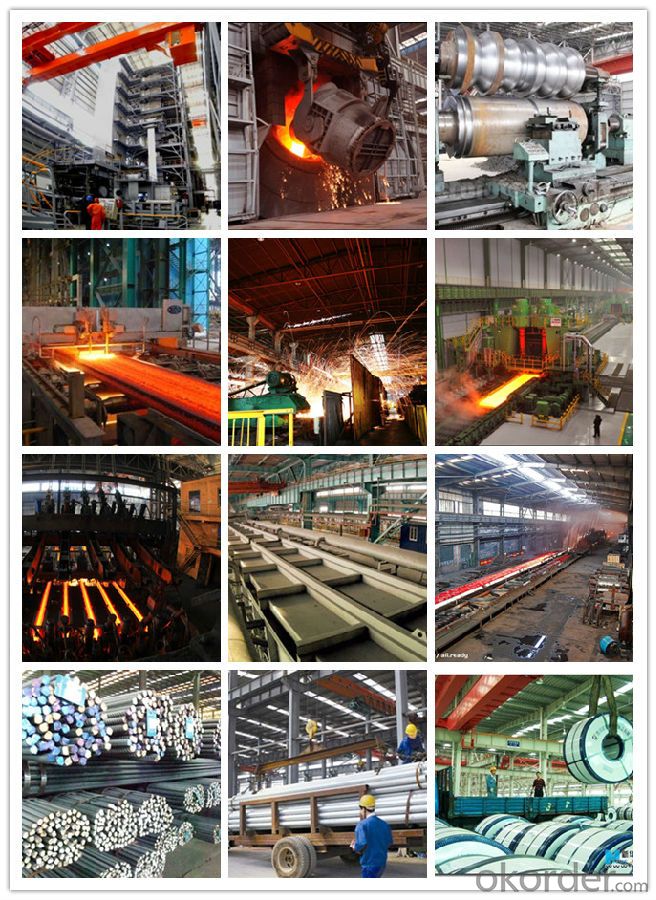
Shipping
1. FedEx/DHL/UPS/TNT for samples, Door-to-Door;
2. By Air or by Sea for batch goods, for FCL; Airport/ Port receiving;
3. Customers specifying freight forwarders or negotiable shipping methods!
Delivery Time: 3-7 days for samples; 5-25 days for batch goods.
Payment Terms
1.Payment: T/T, L/C, Western Union, MoneyGram,PayPal; 30% deposits; 70% balance before delivery.
2.MOQ: 1pcs
3.Warranty : 3 years
4.Package Informations: 1) EXPORT, In 20 feet (GW 25 ton) or 40 feet Container (GW 25 ton)
2)as customer's requirement
Why choose us?
(1) The leading exporter in China special steel industry.
(2) Large stocks for various sizes, fast delivery date.
(3) Good business relationship with China famous factories.
(4) More than 7 years steel exporting experience.
(5) Good after-sales service guarantee.
- Q: What are the main applications of special steel in the marine sector?
- Special steel is widely used in the marine sector for various applications. Some of the main applications include shipbuilding, offshore oil and gas exploration, and marine equipment manufacturing. Special steel is used to construct the hulls and superstructures of ships, as well as various components such as propellers, shafts, and rudders. Its high strength, durability, and corrosion resistance make it ideal for withstanding the harsh conditions of the marine environment. Additionally, special steel is also used in the construction of offshore platforms, pipelines, and underwater structures, as it can withstand extreme pressures and resist corrosion caused by saltwater.
- Q: What are the main applications of special steel in the power transmission industry?
- Special steel is widely used in the power transmission industry for various applications. One of the main applications is in the manufacturing of power transmission components such as gears, shafts, and couplings, where special steel's high strength and durability are essential for transmitting power efficiently. Additionally, special steel is also used in the construction of power transmission towers and poles, providing structural integrity and resistance against harsh environmental conditions. Overall, the main applications of special steel in the power transmission industry revolve around its ability to enhance performance, reliability, and longevity of power transmission systems.
- Q: What are the main characteristics of electrical steel?
- The main characteristics of electrical steel include high magnetic permeability, low electrical resistivity, and low hysteresis loss. It is specifically designed to efficiently conduct and transform electrical energy, making it ideal for use in transformers, motors, and generators.
- Q: What are the effects of different heat treatment processes on special steel?
- Different heat treatment processes can have significant effects on the properties and performance of special steel. These processes are designed to alter the microstructure of the steel, thereby influencing its hardness, strength, toughness, and other mechanical properties. One commonly used heat treatment process is annealing, which involves heating the steel to a specific temperature and then slowly cooling it down. Annealing helps to relieve internal stresses, improve machinability, and enhance the ductility of the steel. It also refines the grain structure, making the steel more uniform and reducing the risk of cracks or other defects. Another heat treatment process is quenching, where the steel is heated to a high temperature and then rapidly cooled by immersing it in a quenching medium such as oil or water. This process results in the formation of a hardened microstructure, increasing the steel's hardness and wear resistance. However, quenching can also make the steel brittle, so it is often followed by a tempering process. Tempering involves reheating the quenched steel to a lower temperature and holding it there for a specific duration. This process helps to reduce the brittleness caused by quenching and improve the steel's toughness and ductility. The resulting microstructure is a balance between hardness and toughness, making the steel suitable for applications that require both strength and impact resistance. Other heat treatment processes, such as normalizing and stress relieving, can also be used to achieve specific properties in special steel. Normalizing involves heating the steel to a temperature above its critical point and then allowing it to cool in still air. This process refines the grain structure and improves the steel's strength and machinability. Stress relieving, on the other hand, aims to remove residual stresses from the steel by heating it to a temperature below its critical point and then slowly cooling it. In summary, the effects of different heat treatment processes on special steel are manifold. These processes can modify the steel's microstructure, resulting in changes in hardness, strength, toughness, and other mechanical properties. By selecting the appropriate heat treatment process, manufacturers can tailor the steel's characteristics to suit specific applications, ensuring optimal performance and longevity.
- Q: What are the main characteristics of wear-resistant castings?
- The main characteristics of wear-resistant castings include high hardness, toughness, and resistance to abrasion, impact, and corrosion. They are designed to withstand harsh environments, reduce downtime, and increase the lifespan of components in industries such as mining, cement, and power generation.
- Q: What are the different methods for controlling the grain size in special steel?
- There are several methods for controlling the grain size in special steel. 1. Heat treatment: One common method is heat treatment, which involves subjecting the steel to specific temperatures and cooling rates. This process can be used to refine the grain size by controlling the rate of nucleation and growth of new grains. For example, slow cooling can promote the formation of larger grains, while rapid cooling can result in smaller grain sizes. 2. Alloying elements: Adding certain alloying elements to the steel can also influence the grain size. For instance, elements like vanadium, niobium, and titanium can form carbides, which act as nucleation sites, leading to finer grain sizes. On the other hand, elements like aluminum and silicon can promote the formation of larger grains. 3. Mechanical deformation: Applying mechanical deformation to the steel, such as through rolling or forging, can also affect the grain size. These processes cause grain refinement by breaking up larger grains into smaller ones. Additionally, severe plastic deformation techniques like equal-channel angular pressing can produce ultrafine grains in special steel. 4. Grain growth inhibitors: Certain elements can act as grain growth inhibitors, preventing the coarsening of grain size during heat treatment. Examples of such elements include boron and zirconium. By controlling the concentration of these inhibitors, it is possible to inhibit grain growth and maintain a desired grain size. 5. Controlled cooling: Controlling the cooling rate during solidification and heat treatment is another method for controlling grain size. By carefully controlling the cooling rate, it is possible to achieve a specific grain size or a desired distribution of grain sizes. It is important to note that the choice of method for controlling grain size in special steel depends on the specific application and desired properties of the steel. Different methods may be employed in combination to achieve the desired grain size and optimize the performance of the steel for its intended use.
- Q: What are the different corrosion-resistant special steel alloys?
- Some examples of corrosion-resistant special steel alloys include stainless steel, which contains chromium and nickel for improved resistance to corrosion; duplex stainless steel, which has a combination of austenite and ferrite structures for enhanced corrosion resistance; and super duplex stainless steel, which has even higher levels of chromium, molybdenum, and nitrogen for superior corrosion resistance in harsh environments. Other corrosion-resistant alloys may include nickel-based alloys, titanium alloys, and aluminum alloys.
- Q: How does special steel contribute to the power generation sector?
- Special steel contributes to the power generation sector by offering enhanced strength, durability, and corrosion resistance properties required for critical components such as turbine blades, shafts, and boiler tubes. This high-performance steel ensures efficient power generation by withstanding extreme temperatures and pressures, thereby increasing the overall efficiency and reliability of power plant operations.
- Q: What are the different methods of surface electroplating for special steel?
- There are several methods of surface electroplating for special steel, including electroless plating, electroplating by immersion, barrel plating, and rack plating. Electroless plating is a chemical process that uses a reducing agent to deposit a layer of metal onto the steel surface. Electroplating by immersion involves immersing the steel in an electrolyte bath and applying an electric current to deposit a metal coating. Barrel plating is a method where the steel parts are placed in a rotating barrel along with the plating solution, creating a tumbling action that ensures an even coating. Rack plating involves suspending the steel parts on a rack and immersing them in the plating bath. Each method has its own advantages and is chosen based on the specific requirements and characteristics of the special steel being plated.
- Q: How does special steel contribute to reducing product rejection rates in quality control?
- Special steel can contribute to reducing product rejection rates in quality control by providing enhanced material properties such as increased strength, hardness, and corrosion resistance. These improved properties make special steel suitable for manufacturing critical components, ensuring that they meet the required specifications and quality standards. By using special steel, manufacturers can produce products that are less prone to defects, leading to lower rejection rates during quality control inspections.
Send your message to us
Round Bar Reinforcing Steel Bars Q345 Special Steel
- Loading Port:
- China main port
- Payment Terms:
- TT OR LC
- Min Order Qty:
- 30 m.t.
- Supply Capability:
- 10000 m.t./month
OKorder Service Pledge
OKorder Financial Service
Similar products
Hot products
Hot Searches
Related keywords
